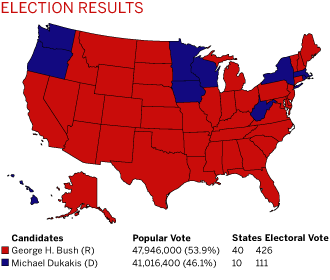1988 Bush VS. Dukakis
"Bio (Spanish)"
Transcript
The Living Room Candidate
"Bio (Spanish)," Dukakis, 1988
Translation appears below transcript
DUKAKIS: Brindando asi nuevas energias, nuevas ideas...
MALE NARRATOR: Michael Dukakis.
FEMALE NARRATOR: Como nosotros, la familia de Michael Dukakis vino a éste país con la esperanza de una vida mejor. Miles de familias Hispanas han hecho lo mismo. La familia Dukakis aprendió y asimiló el idioma y nuevas costumbres. Como nosotros, la familia Dukakis trabaja duro para seguir progresando sin perder sus raices culturales. Nosotros somos el futuro de éste país, y Michael Dukakis y su familia son como nosotros. A ellos les importa la educación, la familia y el engrandecimiento de este país.
MALE NARRATOR: Como muchos de ustedes, los padres de Michael Dukakis vinieron a este país buscando una vida mejor. Hemos progresado bastante, pero aún queda mucho por hacer para garantizar a nuestros hijos un futuro mejor.
FEMALE NARRATOR: Elija a Michael Dukakis; él es como nosotros.
MALE NARRATOR: Con Dukakis, nos entendemos!
Translation:
DUKAKIS: ...Bringing thus new energy and new ideas...
MALE NARRATOR: Michael Dukakis.
FEMALE NARRATOR: Like us, the family of Michael Dukakis came to this country with the hopes of a better life. Thousands of Hispanic families have done the same. The Dukakis family learned and assimilated to the language and new customs. The Dukakis family works hard to keep progressing without losing their cultural roots. We are the future of this country, and Michael Dukakis and his family are like us. They care about education, family and the growth and betterment of this country.
MALE NARRATOR: Like many of you, the parents of Michael Dukakis came to this country seeking a better way of life. We have made great progress, but there is still a lot that remains to be done, so we can guarantee our children a better future.
FEMALE NARRATOR: Choose Michael Dukakis. He's like us.
MALE NARRATOR: With Dukakis, we understand each other!
Credits
"Bio (Spanish)," Dukakis-Bentsen Comm, Inc., 1988
From Museum of the Moving Image, The Living Room Candidate: Presidential Campaign Commercials 1952-2012.
www.livingroomcandidate.org/commercials/1988/bio-spanish (accessed December 29, 2025).
Save
| 1988 | Bush | Dukakis | Results |
Ronald Reagan—the first president since Eisenhower to serve two full terms—had presided over a renewed national optimism, but there were dark clouds on the horizon as his presidency drew to a close. The federal deficit was soaring out of control. The revelation that profits from American sales of weapons to Iran were illegally routed to the Nicaraguan contras spawned a major scandal. Wall Street was in turmoil following several insider-trading scandals and the October 1987 stock market collapse. The stage was set for one of the most bitter presidential campaigns in recent history: Vice President George Bush, who portrayed himself as the rightful heir to the Reagan revolution, versus Massachusetts Governor Michael Dukakis, who offered a traditionally Democratic vision of increased government spending on health care, child care, education, and housing. The Bush campaign used brutal television advertising to portray Dukakis as an ineffective liberal who would gut the country’s defense system and let convicted murderers out of prison. Hoping voters would dismiss the attacks as unfair, Dukakis refused to counterattack until late in the campaign. By then it was too late.
Dan Quayle for vice president
"Experienced Leadership for America’s Future"
The case of Willie Horton--an African American convicted murderer who raped a white woman and tortured her fiancé while on a weekend furlough from a Massachusetts prison--was frequently mentioned by George Bush in campaign speeches. The case was directly referred to in a
Though Bush’s negative commercials garnered most of the attention, his campaign also produced a series of strong positive ads, such as
Bush’s media campaign skillfully supplemented paid publicity (commercials) with free publicity in the form of staged photo opportunities sure to be reported as news--a technique originated by the 1984 Reagan campaign. For example, news footage of Bush receiving the endorsement of the Boston police union reinforced the law-and-order message of the furlough ads. The Bush media campaign was a model of control, supervised in all respects by veteran media consultant Roger Ailes, who also coached Bush for the debates.
Lloyd Bentsen for vice president
"The Best America Is Yet to Come"
The disarray and confusion of the Dukakis campaign was exemplified by a series of commercials known as "The Handlers." In one of these commercials,
Consultants from several ad agencies came and went throughout the run of the Dukakis campaign, and the chain of command was constantly in flux. The campaign considered more than 1,000 ad scripts during a three-month period, and the ads produced were inconsistent in style and devoted almost exclusively to defending against Bush’s attacks. There were no strong ads linking Bush to Panamanian dictator Manuel Noriega, even though Dukakis repeatedly brought up the connection in speeches and debates, or to the Iran-contra arms-for-hostages deal. Most critically, Dukakis failed to respond to the Willie Horton attack until late in the campaign, when he finally aired a counterassault called
Like Mondale in 1984, Dukakis never forged a positive identity in his ads. In his speech accepting the nomination, he had movingly described himself as the embodiment of the American dream, a son of Greek immigrants who was more in touch with the people than George Bush. Inexplicably, this message was almost completely absent from his advertising.



























